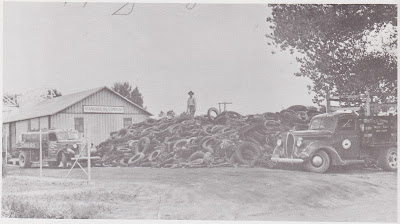As daylight
savings time ends, Coloradans are reminded of the sacrifices of war on the home
front. During the Great War, Congress established a law to ‘preserve daylight’
and conserve energy, thus ensuring ample electricity to produce the aluminum
for building airplanes.
 |
Delta County residents donated 106,000 tons of scrap rubber during the summer of 1942, which were recycled and fitted onto 5,200 planes.
|
After the
attack on Pearl Harbor, President Roosevelt moved the nation onto “War Time,”
which moved the clocks back an hour to save energy to contribute to the war
effort.
In addition
to time, Delta County’s commitment to the war effort came out in other ways. In
the summer of 1942, citizens donated over 106,000 tons of scrap rubber which
were recycled and fitted onto 5,200 planes.
Delta
County played a vital part of the war effort in terms of providing agricultural
products to feed the troops. The Delta County Canning Factory provided tons of
canned vegetables for soldiers.
Mable
Howard, of Delta recalls working at the canning factory during the war. She
said, “It was more than being a teenager with a job; it was about helping our
county too.” Howard was issued an emergency wartime teaching certificate in 1945, and later graduated from Western State College. She taught at
Read, Eckert, and Delta, before retiring in 1989.
As a
service to families with loved ones serving in the war, the Canning Factory
provided cans and sealed the lids so perishable items, such as cookies, could
be sent from home to soldiers in the war zones.
Other
industries in the county were prioritized for the war. The sugar factory, coal
mines, and farm / ranch workers were vital parts of the preferred industries
required to logistically win the war. During the processing season, Holly Sugar
factory workers were deferred when their names appeared for the draft, however,
since the work was seasonal, many temporary workers were drafted during the off
season.
During the
summer of 1943, Delta County played with the idea of establishing a prisoner of
war camp in Delta to generate economic activity. Nothing came of this idea.
The home
front, wearied by war and depression was ready to utilize the energies and
knowledge gained by the returning troops and to set out the task of healing and
building a strong county for the future.
____________________________
M. Soper, "Remembering WWII: On the Home Front" Delta County Independent (Delta, Colo.) 4 Nov. 2015 pg. A8
No comments:
Post a Comment